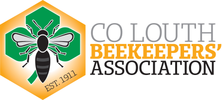Beginners Course
Are you interested in bees? Do you ever wonder how bees collect nectar and pollen and turn them into honey? How do they know what flowers and plants to go to and where they are? If you would like to become a beekeeper and find the answers to these questions and many more join the Louth Beekeepers Beginners Course.
Lectures on beekeeping: This is a series of lectures commencing on Monday, 8th February 2024, 7:30pm to 9:30pm in Teagasc, Dundalk. The idea of these lectures is for you to be certain that you want to jump into beekeeping before having to purchase the necessary equipment. These lectures cover all aspects of beekeeping to include basic beekeeping equipment, the beekeeping year, etc., and will be delivered over a period of 8 weeks by experienced beekeepers. You will receive a Certificate of Completion from our Association at the end. The list of topics is below.
We will be holding a Meet the Beekeepers event on Thursday, 25th January at 7:30pm in Teagasc, Dundalk. This will be an opportunity to chat to the more experienced beekeepers and, if you have not already done so, sign up for the lectures. Soon after that we will organise practical training sessions to give you a chance to assemble hive parts yourself, guided by more experienced beekeepers. The idea is that you should learn how to do the basics correctly, rather than jumping blindly in to putting your own hives together.
The fee for the course is €180 (or €250 for a family). Under-18's are, as usual, free, although they must be accompanied by a responsible adult. The fee can be paid as described on our home page.
Lectures on beekeeping: This is a series of lectures commencing on Monday, 8th February 2024, 7:30pm to 9:30pm in Teagasc, Dundalk. The idea of these lectures is for you to be certain that you want to jump into beekeeping before having to purchase the necessary equipment. These lectures cover all aspects of beekeeping to include basic beekeeping equipment, the beekeeping year, etc., and will be delivered over a period of 8 weeks by experienced beekeepers. You will receive a Certificate of Completion from our Association at the end. The list of topics is below.
We will be holding a Meet the Beekeepers event on Thursday, 25th January at 7:30pm in Teagasc, Dundalk. This will be an opportunity to chat to the more experienced beekeepers and, if you have not already done so, sign up for the lectures. Soon after that we will organise practical training sessions to give you a chance to assemble hive parts yourself, guided by more experienced beekeepers. The idea is that you should learn how to do the basics correctly, rather than jumping blindly in to putting your own hives together.
The fee for the course is €180 (or €250 for a family). Under-18's are, as usual, free, although they must be accompanied by a responsible adult. The fee can be paid as described on our home page.
|
Beginners course beekeeping 2024 All theory lectures start at 7:30 pm in Teagasc, Dundalk. |
|||
|
No. |
Dates 2024 |
Course Content |
Lecturer |
|
|
25 Jan |
Introductory lecture |
Paul Boyle |
|
|
8 Feb |
|
Liam O’Reilly |
|
|
15 Feb |
|
Billy Campbell |
|
|
22 Feb |
|
Jim Carroll |
|
|
29 Feb |
|
Brendan Murray |
|
|
7 Mar |
|
Jim Moynagh |
|
|
14 Mar |
|
Fergel Begley |
|
|
21 Mar |
|
Arjan van Rossum |
|
|
28 Mar |
|
Frankie de Dobbelaere |
|
|
TBC |
|
TBC |
Practical experience in beekeeping: This part is for those of you who decide that they really do want to keep bees. This part of the course will entail attendance at our Association Apiary which is situated outside Dundalk, for practical sessions. There you will be shown by experienced beekeepers how to look after your bees. These sessions will take place once a week during the Summer months and may be held on a weekend morning or an evening during the week.
If the scheduled times at the apiary do not suit you, please let us know and we will try to accommodate you.
If the scheduled times at the apiary do not suit you, please let us know and we will try to accommodate you.
E-book for the old education system
|
We produced an e-book to help with the old FIBKA exams - you can download it here. It should help explain many beekeeping concepts, although it is not comprehensive. If you find anything that's insufficiently explained, or have any other comments, please email [email protected]
|
| ||

